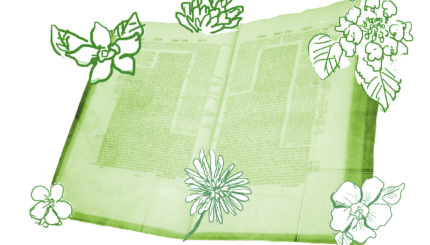Especially in a system of religious law, like halakhah, it is easy to assume that rules are black and white. And some things are: Pork is never kosher,* Shabbat always begins at sundown.
But as today’s page reminds us, there’s a lot of gray area — and sometimes in places we might not expect. At times the rabbis intentionally relax halakhic requirements because of a concern that requiring people to adhere one law will interfere with their observance of another. This is particularly the case with regard to the observance of festivals, which are meant to be a time of abundant joy (e.g. Deuteronomy 16:10–15). On today’s page, Ulla offers three examples of relaxed legal requirements which are meant to preserve the joy of festival observance, starting with this:
They permitted spreading out the hide of an animal slaughtered on a festival before those who will tread on it.
Tanning a hide into leather is one of the 39 categories of forbidden labor — and trampling that hide was an early step in the process. So it is surprising that here Ulla tells us that not only may we trample the hide, but it is intentionally laid out in a place where people will do so. The reason, he explains, is that were the rabbis to prohibit the placement of the hide in a place where people are prone to walk, people would worry about someone accidentally treading on a large new hide during the festival. They might even, therefore, decide not to slaughter an animal for the festival in the first place and, as a result, their festive meal would have less food — making it, well, less festive.

Help us keep Jewish knowledge accessible to millions of people around the world.
Your donation to My Jewish Learning fuels endless journeys of Jewish discovery. With your help, My Jewish Learning can continue to provide nonstop opportunities for learning, connection and growth.
Another example: The rabbis permitted the replacement of shop shutters during a festival, an activity that seems to violate the prohibition on building and demolishing. Why? To allow shopkeepers to open their shutters in the morning, allowing people to take produce and other goods that they needed to celebrate the festival (which they would pay for later) and close them up again at night. Here too, the rabbis would be inclined to prohibit this activity (because it is considering building and, although the text does not mention it, because it is a form of commerce) were it not for the fact that it allowed people to obtain what they needed to celebrate a holiday. Once again, laying a beautiful holiday table is a greater priority than perfect avoidance of forbidden labor.
The third case permits priests to replace bandages after serving in the Temple. Certain tasks required the priests to handle objects directly, and those that were injured could not perform them if a bandage prevented direct touch. Ordinarily, the rabbis do not allow one to replace a bandage on a festival, and we would expect injured priests might refrain from volunteering for Temple service on a festival. But here too, the rabbis make an exception to keep the rules from discouraging injured priests from participating in festival activities.
The rabbinic rules that restrict labor on festivals are there to “protect the holiday,” that is, to help ensure that people refrain from work and celebrate with joy. But rules, by their very nature, are restrictive and can feel limiting to those upon whom they fall — especially when they curtail priestly involvement into Temple or prevent someone from making a nice meal. And the rabbis are very sensitive to these potentially unintended consequences. While Ulla’s statement does not reveal much about why the rabbis chose these three specific instances (and not others) to relax the rules in order to enhance holiday celebrations, it does show that the rabbis were aware that sometimes in order to “protect the holiday” you have to adjust the rules to make sure that they do not drown out the joy.
*Pork is never kosher, but you can eat it to save your life.
Read all of Beitzah 11 on Sefaria.
This piece originally appeared in a My Jewish Learning Daf Yomi email newsletter sent on September 11th, 2021. If you are interested in receiving the newsletter, sign up here.



